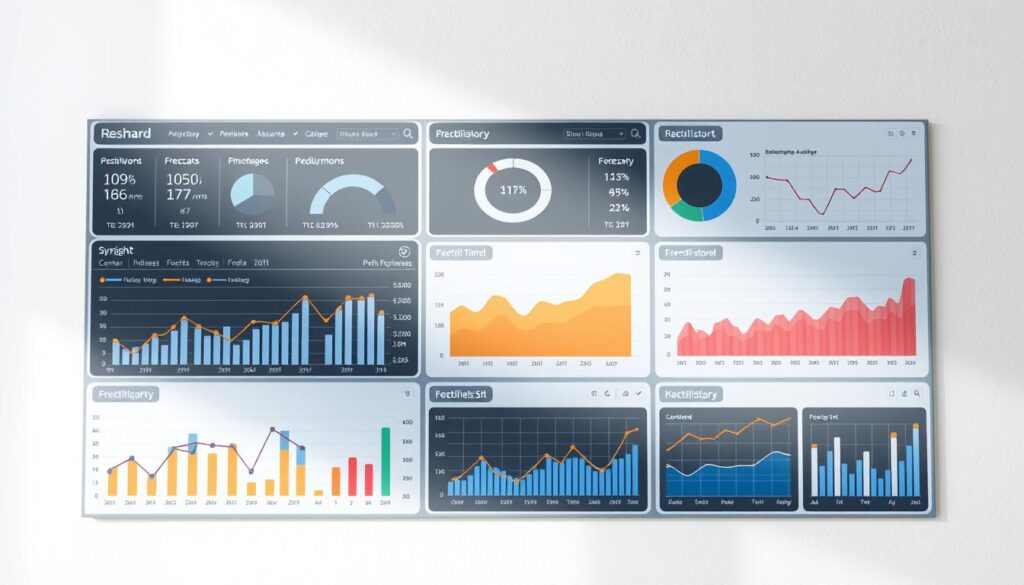Imagine if you could save up to 30% of your employees’ time with just technology. Artificial intelligence is changing how businesses work in many fields. In Southeast Asia, AI platforms are key, not just a trend. They help companies improve processes, make smarter choices, and please customers more.
This article will show how AI is more than a tool. It’s a game-changer that lets businesses keep up with market changes like never before.
Key Takeaways
- AI can automate repetitive tasks, freeing up 20-30% of employee time for strategic activities.
- Companies leveraging AI for decision-making can see operational efficiency improvements of up to 40%.
- AI-powered chatbots can manage up to 80% of customer inquiries, easing human workloads.
- Businesses using AI for inventory management have reported reductions in stockouts and overstocked items by 10-20%.
- AI-enhanced analytics can speed up data processing times by 70%, facilitating quicker decision-making.
Understanding the Basics of AI in Business Operations
Artificial intelligence (AI) changes how businesses work. It automates tasks, improves decision-making, and boosts efficiency. By using AI, companies can work smarter and focus more on customer needs. Knowing how AI helps in business operations is key to using it well.
Definition of AI and Its Importance
AI makes machines think and learn like humans. It’s crucial for making businesses run better. With AI, companies can do things faster, make fewer mistakes, and meet customer needs quickly.
The Historical Context of AI Development
AI has roots in ancient myths and philosophy. It became real in the mid-20th century with computing advances. Today, more data and better computers have made AI grow fast. For example, AI use in business has doubled since 2017, according to McKinsey & Company.
By 2025, AI will help create 30% of marketing content. This shows AI’s growing role in many areas.
More companies are investing in AI, with 63% planning to spend more in the next three years. This shows AI’s importance in business plans. Companies using AI have seen costs drop by up to 40%, helping them grow.
| AI Technology | Application | Benefit |
|---|---|---|
| Predictive Analytics | Supply Chain Management | Reduced bottlenecks and improved inventory accuracy by 30% |
| Conversational AI | Customer Support | Improved client prioritization leading to savings of USD 80 million |
| AIOps | IT Operations | Faster anomaly detection and error troubleshooting |
By using AI, businesses can keep up with market changes and improve services. As AI gets better, it will change business operations even more, leading to new ideas in many fields.
How AI Platforms are Transforming Operations
AI platforms are changing how businesses work. They help automate tasks, improve decision-making, and boost efficiency. AI tools are key in today’s business world, helping companies reach new heights.
Key Advantages of AI Integration
AI boosts productivity by analyzing data fast. It cuts down forecasting errors by up to 50%. This leads to better inventory management and less lost sales.
AI gives real-time insights and predictions. This is crucial for smart operations management.
Impact on Decision-Making Processes
AI automates tasks, freeing teams for strategy. It offers quick advice, helping businesses adapt to market changes. Companies using AI see big wins, like IBM saving USD 160 million.
AI provides accurate, timely info. This leads to better decisions and a stronger market position.

Identifying AI Operational Tools for Your Business
Today, businesses have many AI tools to help them work better. It’s important to know what tools are out there and pick the right ones. This can make your business more productive and help it grow.
Types of AI Tools Available
There are many AI tools for different needs in various industries. These tools can be grouped into several types:
- Chatbots: They offer quick help and answers to customers.
- Predictive Analytics Tools: These tools forecast trends, helping with inventory and saving money.
- Robotic Process Automation (RPA): It automates tasks, giving employees more time for important work.
- AI Optimization Platforms: They find and fix process problems, making things more efficient.
- Machine Learning Algorithms: They analyze data to give insights and improve decisions.
Choosing the Right AI Tools for Your Needs
Choosing the right AI tools is important. Look at their features, how they grow with your business, how well they work with other systems, and their cost. Businesses that match their AI tools to their needs see big improvements.
Here are some things to think about when making your choice:
| Criteria | Importance | Example Tools |
|---|---|---|
| Functionality | How well it works | IBM Maximo Application Suite |
| Scalability | Can it grow with your business? | Amazon SageMaker |
| Integration Capabilities | Does it work well with other systems? | Zapier |
| Cost-Effectiveness | Is it worth the cost? | Brevo |
Using AI tools smartly helps businesses run smoother and meet market changes better. Knowing about AI tools lets companies use them to work more efficiently and productively.
AI Platforms for Operations, Streamlining with AI, AI Operational Tools
AI platforms for operations are key to making businesses more efficient. They use data analytics and automate tasks. This helps companies grow their revenue by 6% to 10%.
Big names like Microsoft Azure and Amazon SageMaker offer top AI solutions. They help use resources better and cut down on delays. For example, Microsoft Azure’s small language models boost AI for many uses. Amazon SageMaker makes data prep fast, from months to minutes.
In the Philippines, companies can use H2O.ai and Dataiku to get the most out of AI. H2O.ai handles lots of documents, and Dataiku makes projects quick. This boosts productivity and efficiency, key for any business.
OCBC Bank saw a 72% productivity jump with AI chatbots. This shows AI can make work better and more efficient. AI can also cut costs by up to 30% for businesses.

More companies are seeing the value in AI. It improves communication and decision-making. This leads to happier customers and a stronger market position.
Automating Repetitive Tasks with AI
The world of business has changed a lot with automation. Robotic Process Automation (RPA) is a big part of this change. It helps companies automate tasks that people used to do. This makes work more efficient and lets employees do more important things.
Overview of Robotic Process Automation (RPA)
RPA uses AI to make work flows better. It helps companies deal with lots of data quickly and well. AI is great at doing many things at once, like helping with customer service.
For example, AI chatbots can help customers 24/7. This saves money on keeping big teams for customer service. It’s very important in today’s fast world.
Benefits of Task Automation for Businesses
Automating tasks has many benefits. Some of the main ones are:
- Increased Accuracy: Automation makes fewer mistakes in tasks like data entry and money work. This means better and more reliable data.
- Real-Time Data Processing: AI can quickly process and analyze data. This gives companies fast insights and helps them make better decisions.
- Task Simplification: Automation makes things like tracking expenses and payroll easier. This cuts down on work that’s not important.
- Scalability: Companies can handle lots of questions and tasks without needing more people. This makes them more flexible and able to grow.
Using RPA makes companies work better and be ready for new challenges. By using AI in their daily work, businesses can do more and grow stronger.
Enhancing Customer Service Through AI Technology
AI technology is key in enhancing customer experience in many fields. Companies use AI chatbots to make their customer service better. These chatbots work all day, every day, answering questions quickly and handling most interactions.
This lets human agents deal with harder tasks. It makes the support system more efficient and helpful.
Companies like Unity have seen big benefits from using AI. They’ve cut down on tickets and saved money. AI also makes responses faster and makes customers happier. For example, Rentman keeps customers very happy, with a score of 93 percent, and answers quickly.
AI can predict what customers might want next. It looks at past chats to guess future ones. This helps companies tailor their services better. AI can also tell if a customer is upset, so teams can help right away.
| AI Feature | Benefits |
|---|---|
| 24/7 Availability | Decreased hold times, increased customer satisfaction |
| Instant Responses | Improved efficiency, reduced waiting |
| Multilingual Support | Assists a global customer base |
| Proactive Issue Resolution | Mitigates potential problems before escalation |
| Automated Ticket Routing | Reduces response times by directing inquiries accurately |
AI offers huge chances for better customer service. Soon, AI will be in every customer interaction. Companies need to use AI chatbots and other tools to stay ahead. They improve customer service, make things run smoother, save money, and boost quality.

Optimizing Resource Management with AI
In today’s digital world, AI is changing the game for businesses. It helps with everything from tracking inventory to smart supply chain plans. Companies use AI to make their operations smoother and more efficient.
Real-Time Inventory Tracking
AI lets companies track inventory in real-time. This gives them better control over what they have. They can predict what they’ll need based on demand, avoiding too much or too little stock.
Retailers and manufacturers benefit a lot. AI helps them make quick decisions and act fast when stock levels change. This makes their operations run better and keeps inventory levels just right.
Supply Chain Optimization Strategies
AI changes how companies manage their supply chains. It analyzes data and predicts trends. This helps companies improve their logistics, saving time and money.
AI makes processes more efficient and gives insights for better decision-making. This leads to better service and more productivity. By using AI, companies can manage resources better and schedule more efficiently. Choosing the right AI tools helps achieve business goals.
| Technology | Benefit | Impact on Cost |
|---|---|---|
| Real-Time Tracking | Improved inventory control | Reduces excess stock costs |
| Predictive Analytics | Accurate demand forecasting | Minimizes stockout risks |
| Supply Chain Tools | Enhanced logistics | Lowers operational costs |
Improving Operational Efficiency with Predictive Analytics
Predictive analytics is changing how businesses work. It uses AI to look at past data and guess what will happen next. This helps companies make better choices.
Examples of Predictive Model Applications
Many industries use predictive analytics in different ways. For example:
- In healthcare, it helps plan better, making sure patients get the care they need without mistakes.
- Retailers use it to guess how much stock they’ll need, cutting down on waste and saving money.
- Manufacturers use AI to guess how much they’ll sell, helping them manage their stock better.
- Telecom companies use AI chatbots to handle lots of customer calls, freeing up staff for harder tasks.
Benefits of Data-Driven Decision Making
Using predictive analytics for decision making has many benefits. It helps businesses grow:
- It saves money by using resources wisely and cutting down on mistakes.
- It finds and fixes problems fast, making work more efficient.
- AI helps find new ideas faster, getting products to market quicker.
- In manufacturing, AI spots mistakes 90% better, showing the power of good data.

Challenges in Implementing AI Solutions
Using artificial intelligence in business comes with its own set of hurdles. Companies face many complexities when trying to add AI to their operations. These issues affect everything from how they manage data to how their teams adapt.
Data Quality and Integration Issues
Problems with data quality can really hinder AI success. Businesses often deal with huge amounts of data that need to be well-managed for accurate insights. Bad data can lead to poor decisions, which hurts AI’s benefits.
There are also challenges when trying to mix AI with current systems. Old systems can be a big problem. To overcome this, companies need help from experts who know how to smoothly add AI to their daily work.
Workforce Adaptation and Training Needs
AI changes job roles, which means workers need training. This training takes time and resources. The lack of skills in the workforce is a big obstacle, making it crucial for companies to offer good training.
Also, AI might replace some jobs, causing worry. But, companies can help by offering training for new roles created by AI. This not only boosts employee confidence but also helps the company adapt to digital changes.
Conclusion
In today’s fast world, AI is key to making businesses run better. It helps automate tasks, manage resources, and make smarter decisions. AI is changing how companies work, and it’s clear why.
The publishing world is a great example of AI’s impact. It automates editing and improves peer reviews. This makes publishing faster and more accurate. As AI gets better, it will bring even more solutions to businesses.
Businesses in the Philippines and Southeast Asia need to use AI to stay ahead. AI can help them grow, serve customers better, and work more efficiently. For more on AI’s role in leadership, click here.

